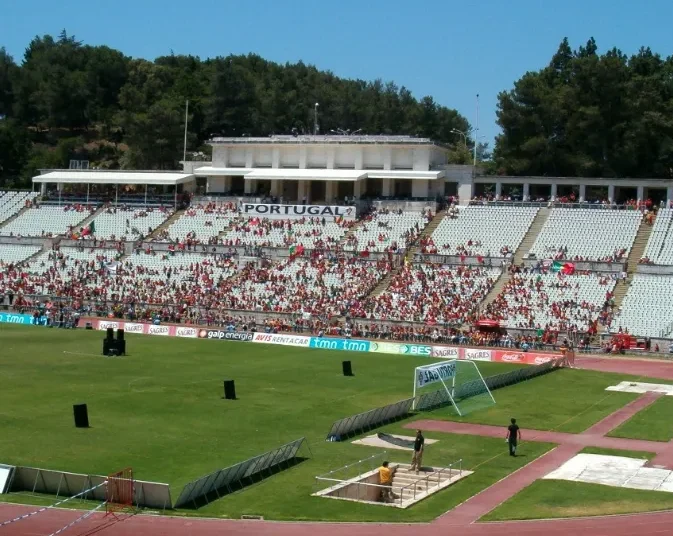Football stadiums are more than just places where games are played; they are where history is made and passion comes to life. In Portugal, some of the most famous football arenas have witnessed unforgettable moments, from historic victories to unforgettable defeats. These stadiums are not just physical structures; they are temples of football that have captured the hearts of fans for decades. Let’s dive into the stories behind Portugal’s most iconic stadiums.
Estádio Nacional: The Heart of Portuguese Football
Estádio Nacional, located in Jamor, has long been considered the home of Portuguese football. Opened in 1944, it was initially designed to be a world-class venue for its time. The stadium’s inaugural match featured Sporting and Benfica, playing for two trophies, setting the stage for what would become a rich legacy.
Over the years, Estádio Nacional has seen both triumph and tragedy. While it hosted Portugal’s first major defeats, including a crushing 10-0 loss to England in 1947, it has also been the site of memorable victories. It is especially famous for hosting the final of the Taça de Portugal, where fans eagerly await each year to see their teams fight for glory. Notably, the stadium also holds significance for Celtic fans, who celebrated their only European Cup win here in 1967.
Estádio da Luz: A Dream Stage for Benfica
Estádio da Luz, Benfica’s iconic home ground, has witnessed countless historic moments since its inauguration in 1954. The original stadium, which could hold 120,000 spectators, was where Portugal secured its spot in the 1984 European Championship and where Rui Costa’s memorable goal helped Portugal qualify for Euro 1996.
The new Estádio da Luz, opened in 2003, gained fame when it hosted Portugal’s disappointing loss to Greece in the Euro 2004 final. However, it quickly became the backdrop for numerous other successes, including major UEFA Champions League finals in 2014 and 2020. It remains a symbol of dreams and determination for Benfica fans.
Estádio de Alvalade: A Nest of Champions
Located in Lisbon, Estádio de Alvalade is another stadium with a rich history. The original version, inaugurated in 1956, was the first stadium in Portugal to host a televised match. By 2003, it was replaced by the modern Estádio José Alvalade, a UEFA five-star rated venue.
This stadium has witnessed some of Portugal’s finest moments, including Cristiano Ronaldo’s performances during Euro 2004. The modern stadium continues to host memorable matches and remains one of the best football venues in Portugal, bringing fans from around the world to celebrate the beautiful game.
Estádio do Dragão: The Fortress of Porto
FC Porto’s Estádio do Dragão stands as a fortress of Portuguese football. Before this state-of-the-art stadium opened in 2003, Porto played their home matches at Estádio das Antas, which became the site of numerous triumphs, including Porto’s 1987 European Cup victory. Estádio do Dragão has seen its own share of successes, including Portugal’s Nations League win in 2019. The stadium also became a venue for record-breaking attendance during women’s football matches in 2024.
Portugal’s Largest Stadiums
Portugal boasts many impressive stadiums, some with a rich history and others that offer fans modern comforts. Here are the top 10 largest football stadiums in Portugal:
Estádio da Luz – 65,592 seats
Estádio José Alvalade – 50,095 seats
Estádio do Dragão – 50,033 seats
Estádio Nacional – 37,593 seats
Estádio Municipal de Aveiro – 32,830 seats
Estádio Algarve – 30,305 seats
Estádio Municipal de Braga – 30,286 seats
Estádio D. Afonso Henriques – 30,029 seats
Estádio Cidade de Coimbra – 29,622 seats
Estádio do Bessa XXI – 28,263 seats
Looking Ahead: The 2030 FIFA World Cup
As Portugal prepares to co-host the 2030 FIFA World Cup with Spain and Morocco, major renovations are underway at several iconic venues. Estádio Nacional, along with Estádio da Luz, Estádio de Alvalade, and Estádio do Dragão, will undergo significant upgrades to meet global standards. These modernized stadiums will serve as the backdrop for future unforgettable matches, and perhaps even Portugal’s long-awaited World Cup victory.
These stadiums are not just places where football is played—they are a reflection of Portugal’s passion for the sport. Each stadium tells its own story, from historic defeats to legendary victories, and they continue to inspire generations of fans. Whether it’s the rich history of Estádio Nacional or the modern grandeur of Estádio do Dragão, these football temples remain at the heart of Portugal’s football culture.














